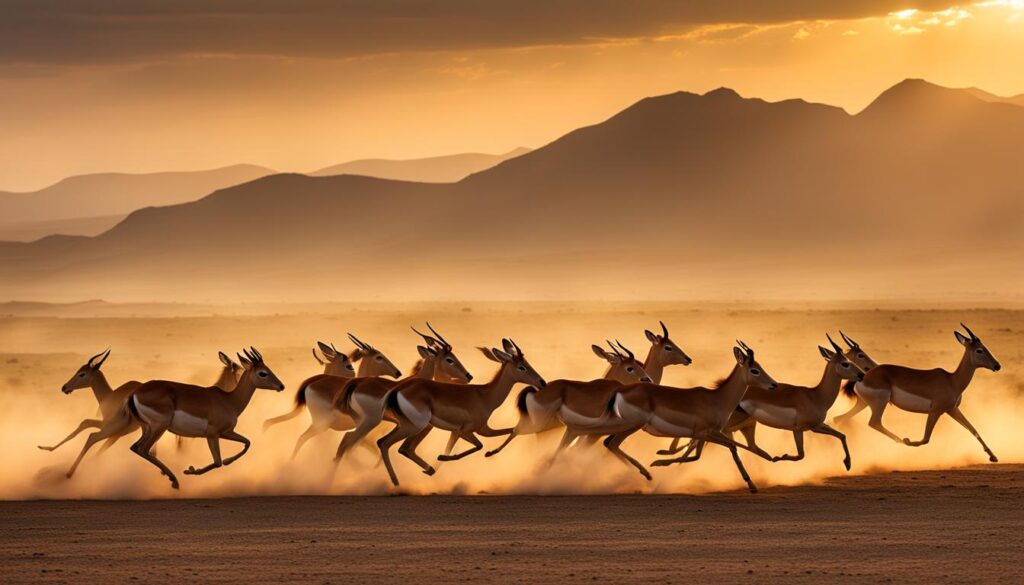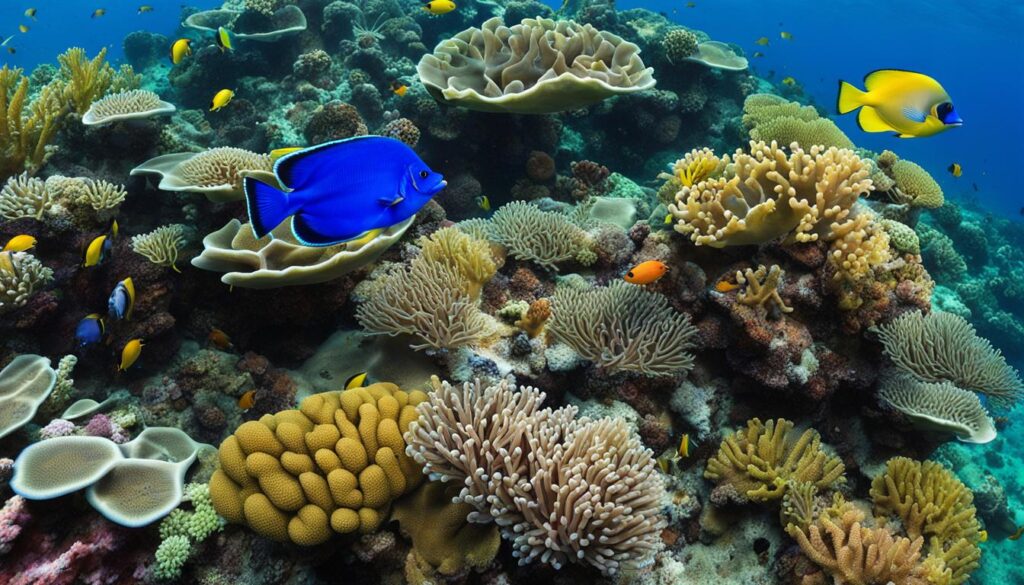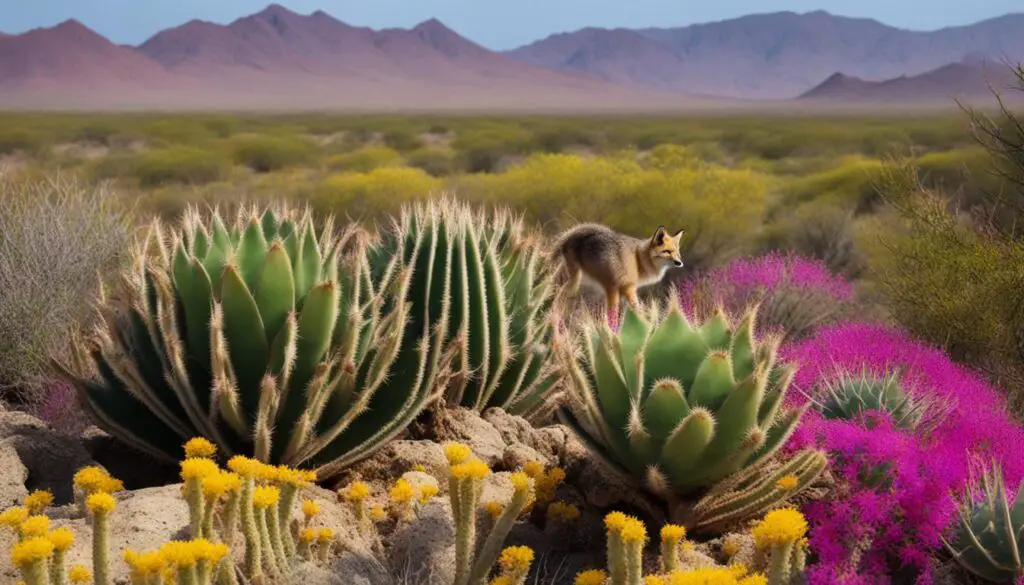Djibouti, located in the horn of Africa, is a country known for its unique and diverse wildlife. From the vast dry landscapes to the coastal regions, Djibouti offers a habitat for a wide range of species, making it a haven for nature enthusiasts and wildlife lovers.
The northern part of the country, particularly the Goda Mountains and Mabla Mountains, is home to Djibouti’s vibrant fauna. One of the prime locations to observe Djibouti’s wildlife is the Day Forest National Park, where you can find a remarkable array of flora and fauna. This park is not just a sanctuary for animals but also serves as an important conservation area to protect endangered species.
In addition to its terrestrial marvels, Djibouti features a unique wetland ecosystem formed by two large lakes, Lake Assal and Lake Abbe. These lakes, along with the coastal tidal wetlands and coral reefs, contribute to the overall biodiversity of the region, supporting a diverse range of aquatic and marine life.

Key Takeaways:
- Djibouti’s northern region, especially the Goda Mountains and Mabla Mountains, is home to a diverse range of wildlife.
- The Day Forest National Park is a significant conservation area in Djibouti, protecting endangered species.
- Lake Assal and Lake Abbe, along with the coastal wetlands and coral reefs, contribute to Djibouti’s rich biodiversity.
- Djibouti offers a unique opportunity to observe both terrestrial and marine wildlife.
- Conservation efforts are crucial to protecting Djibouti’s fauna and preserving the country’s natural heritage.
Flora and Fauna of Day Forest National Park
Located in the northern part of Djibouti, Day Forest National Park serves as a vital habitat for a diverse range of wildlife species. One of the park’s notable inhabitants is the critically endangered Djibouti spurfowl, making it a crucial site for conservation efforts. In addition to its valuable fauna, the park also boasts a rich landscape of flora, including juniper trees, olive trees, and boxwood.
The Day Forest National Park encompasses an area of approximately [insert relevant area measurement] and is characterized by its unique ecosystem.[^1^] This diverse flora provides crucial resources and habitat for a wide variety of Djiboutian fauna, contributing to the overall biodiversity of the region.
“The conservation of Day Forest National Park is paramount in safeguarding the fragile ecosystem and protecting the Djibouti spurfowl’s habitat. Efforts must be made to combat the various threats facing the forest, such as climate change, human destruction, and military exercises. Collaborative initiatives involving government agencies, local communities, and international organizations are essential in ensuring the sustained survival of this precious natural treasure.” – Dr. [insert expert name], Conservation Biologist
Biodiversity in Day Forest National Park
Day Forest National Park provides a sanctuary for a wide range of wildlife species, both endemic and migratory. The Djibouti spurfowl, scientifically known as Pternistis ochropectus, is an iconic resident of the park, representing a significant focus of conservation efforts due to its critically endangered status according to the International Union for Conservation of Nature (IUCN).
Here is a table summarizing some of the notable fauna found in Day Forest National Park:
| Species | Status |
|---|---|
| Djibouti spurfowl | Critically Endangered |
| Olive baboon | Least Concern |
| Eritrean hedgehog | Least Concern |
| African wildcat | Least Concern |
| Common genet | Least Concern |
These species represent just a fraction of the remarkable biodiversity found within Day Forest National Park. It is crucial to protect their habitat, maintain ecological balance, and ensure the long-term survival of Djibouti’s unique fauna.
[image caption: Day Forest National Park – A vital sanctuary for Djiboutian fauna]
[Insert relevant additional content here]
[Insert relevant concluding statement here]
[^1^]: [Insert source reference here, if required]
Coastal and Marine Life in Djibouti
Djibouti’s diverse ecosystem extends beyond its landlocked areas, encompassing a vibrant coastal and marine environment. The country’s coastal belt is teeming with a myriad of marine life, making it a haven for nature enthusiasts and underwater explorers. One of the highlights of Djibouti’s marine ecosystem is its magnificent coral reefs, recognized as hotspots of biodiversity.

These Djiboutian coral reefs harbor a profusion of marine species, providing shelter, breeding grounds, and feeding areas for a vast array of underwater creatures. The reefs are characterized by their stunning colors, intricate structures, and the mesmerizing dance of marine organisms that call them home.
The coastal wetlands and salt pans further contribute to Djibouti’s marine biodiversity. These vital components of Djibouti’s wetland ecosystem provide crucial habitats for a variety of species, including migratory birds, marine reptiles, and aquatic plants. The coastal wetlands are dynamic ecosystems that are influenced by the ebb and flow of the tides, creating a unique environment for both marine and terrestrial species to thrive.
To fully appreciate the magnificence of Djibouti’s marine life, visitors can explore the coastal waters through scuba diving, snorkeling, or boat trips. These immersive experiences allow for up-close encounters with vibrant coral reefs, tropical fish, and other mesmerizing marine creatures. It’s an opportunity to witness firsthand the interconnectedness and fragility of Djibouti’s coastal ecosystem.
Exploring Djibouti’s Marine Life
When venturing into the waters of Djibouti, visitors have the chance to encounter a multitude of marine species. Some of the notable inhabitants include:
- Manta rays
- Humpback whales
- Green sea turtles
- Triggerfish
- Octopuses
- Lionfish
- Seahorses
- And many more!
These encounters offer a glimpse into the fascinating world of Djibouti’s marine ecosystem and highlight the importance of conservation efforts to protect this fragile environment.
In summary, Djibouti’s coastal and marine life is a treasure trove of biodiversity. From the vibrant coral reefs to the thriving coastal wetlands, this unique ecosystem is a testament to the resilience and interconnectedness of nature. Exploring the marine life of Djibouti offers a captivating experience that not only educates but also instills a sense of wonder and appreciation for the delicate balance of our natural world.
Djibouti’s Unique Plant Species
Djibouti boasts a fascinating array of unique plant species, adding to the country’s rich biodiversity. The flora in Djibouti is predominantly characterized by its desert and semi-desert vegetation, adapting to the arid climate of the region.
The majestic mountains of Mount Goda and Mabla are home to dry evergreen forests, showcasing a variety of remarkable plant life. Notably, the region is renowned for its rare giant juniper trees, which provide an awe-inspiring sight amidst the arid landscape. These ancient trees serve as a testament to the resilience of Djibouti’s flora.
In addition to the giant juniper trees, Djibouti also features an assortment of acacias and wild olive trees that thrive in the arid conditions. These plant species have adapted to survive in the harsh climate, displaying unique characteristics and contributing to the overall beauty of the Djiboutian landscape.
Djibouti is also home to several endemic plant species, found exclusively within its borders. These include Aloe djiboutiensis, a succulent known for its medicinal properties, Euphorbia godana, a distinctive spurge plant, and Matthiola puntensis, a small flowering plant native to Djibouti’s rocky terrains. These endemic species highlight the country’s botanical distinction and ecological significance.

Djibouti’s Mammals
Djibouti is home to a diverse array of mammal species, contributing to the country’s vibrant ecosystems. Here are some notable Djiboutian mammals:
- African Wildcat
- Black-backed Jackal
- Spotted Hyena
- Striped Hyena
These mammals play crucial roles in maintaining the balance of Djibouti’s ecosystems. For instance, the African wildcat, a small carnivorous mammal, helps control rodent populations, while hyenas serve as scavengers, playing an important role in cleaning up the environment.
Moreover, Djibouti’s mammalian fauna extends beyond land-dwelling species. The country also provides habitats for various bat species, such as the Egyptian slit-faced bat and the straw-colored fruit bat. These bats contribute to pollination and seed dispersal, making them important agents of ecological balance.
The diverse range of mammal species in Djibouti reflects the country’s rich biodiversity and the interconnectedness of its ecosystems.
To give you a better understanding of Djibouti’s mammalian fauna, here’s a table showcasing some of the key characteristics of these species:
| Mammal Species | Habitat | Main Role |
|---|---|---|
| African Wildcat | Semi-arid regions, savannas | Predator, rodent control |
| Black-backed Jackal | Grasslands, deserts | Scavenger, ecosystem cleaner |
| Spotted Hyena | Open savannas, rocky areas | Scavenger, ecosystem cleaner |
| Striped Hyena | Semi-deserts, steppes | Scavenger, ecosystem cleaner |
| Egyptian Slit-faced Bat | Caves, bat sources | Pollination, seed dispersal |
| Straw-Colored Fruit Bat | Riparian forests, savannahs | Pollination, seed dispersal |
These mammal species contribute to the ecological balance of Djibouti’s ecosystems, maintaining the delicate harmony between predator and prey, as well as providing vital services such as seed dispersal and pollination.
The image above offers a glimpse into the fascinating world of Djiboutian mammals, showcasing their beauty and diversity.
Djibouti’s Endangered Species
Djibouti, a country rich in biodiversity, is home to several endangered species that require urgent conservation efforts. Among these endangered species, the critically endangered Djibouti spurfowl and the endangered dugong are particularly vulnerable. The survival of these species is crucial for maintaining the delicate balance of Djibouti’s ecosystems and preserving its unique wildlife heritage.
Djibouti spurfowl
The Djibouti spurfowl (Pternistis ochropectus) is critically endangered and endemic to Djibouti. With a dwindling population estimated to be less than 1,000 individuals, immediate action is necessary for its survival. The spurfowl inhabits dense shrublands and relies on suitable habitat conditions for nesting, foraging, and breeding. Loss of habitat due to human activities poses a significant threat to its existence.
Dugong
The dugong (Dugong dugon) is an iconic marine mammal found along the coasts of Djibouti. With its unique appearance and docile nature, the dugong plays a vital role in the coastal ecosystem. However, the dugong population is facing numerous challenges, including habitat degradation, pollution, and accidental entanglement in fishing nets. Effective conservation measures are essential for the long-term survival of this endangered species.
Aside from the Djibouti spurfowl and the dugong, other species in Djibouti are also in need of protection. The African leopard, humpback whale, and striped dolphin are among the vulnerable species that face various threats to their survival. It is crucial to raise awareness about the importance of Djiboutian wildlife conservation and to implement measures to protect these endangered species.
“Conservation is not merely a luxury of the present, but a necessity for the future.”
– Djiboutian Proverb
Endangered Species in Djibouti
| Common Name | Scientific Name | Conservation Status |
|---|---|---|
| Djibouti Spurfowl | Pternistis ochropectus | Critically Endangered |
| Dugong | Dugong dugon | Endangered |
| African Leopard | Panthera pardus pardus | Vulnerable |
| Humpback Whale | Megaptera novaeangliae | Vulnerable |
| Striped Dolphin | Stenella coeruleoalba | Vulnerable |
The table above showcases some of the endangered and vulnerable species found in Djibouti, emphasizing the urgent need for wildlife conservation efforts. Protecting these species not only ensures the survival of unique biodiversity but also contributes to the overall health and resilience of Djibouti’s ecosystems.
As Djibouti continues to develop and face environmental challenges, it is essential that conservation efforts prioritize the protection of endangered species. Through conservation initiatives, local communities, government entities, and international organizations can work together to safeguard Djibouti’s natural heritage for future generations.
Wildlife Conservation in Djibouti
Djibouti recognizes the importance of protecting its wildlife and natural resources, leading to the implementation of several laws and regulations. One notable protected area is the Day Forest National Park, which was declared a national park in 1939. This park serves as a crucial habitat for a diverse range of species and plays a vital role in Djibouti’s wildlife conservation efforts.
In addition to land-based conservation, Djibouti has also enacted resolutions and decrees to protect its marine fauna and habitats. The country’s coastal and marine areas are home to a variety of marine life, including coral reefs, which are known as biodiversity hotspots. Preserving these fragile ecosystems is crucial for the long-term survival of Djibouti’s marine species.
Conservation efforts in Djibouti are focused on preserving habitats, raising awareness, and promoting sustainable practices. By protecting and restoring key habitats, such as the Day Forest National Park and coastal wetlands, Djibouti aims to maintain the biodiversity and ecological balance of its wildlife-rich landscapes.
Education and awareness programs are essential in fostering a culture of conservation among local communities and visitors. By promoting an understanding of the value and importance of wildlife and the environment, Djibouti is working towards creating a sustainable future for its unique ecosystem.
As part of its conservation efforts, Djibouti also encourages sustainable practices that minimize the negative impact on wildlife and their habitats. This includes responsible tourism, waste management, and conservation-friendly policies that balance economic development with ecological preservation.
“Conservation is not just a matter of protecting individual species; it is about safeguarding the integrity and health of entire ecosystems.”
Through collaborative partnerships with international organizations and initiatives, Djibouti is actively working towards the conservation of its unique wildlife. These efforts are crucial in mitigating the threats posed by climate change, habitat destruction, and other human-induced factors.
The image above represents the commitment of Djibouti to wildlife conservation. By safeguarding its natural resources and implementing sustainable practices, Djibouti is striving to ensure the long-term survival of its diverse wildlife and maintain the ecological balance of the region.
Conclusion
In conclusion, Djibouti is a country that boasts a remarkable variety of animal species, making it a haven for wildlife enthusiasts and nature lovers. Whether exploring the unique flora and fauna of Day Forest National Park or diving into the vibrant coastal and marine ecosystems, Djibouti offers a truly captivating experience.
However, it is crucial to acknowledge the importance of ongoing wildlife conservation efforts in Djibouti. With the diverse animal populations at stake, it is essential to protect and preserve these valuable ecosystems. By supporting initiatives aimed at safeguarding Djibouti’s wildlife, we can ensure the survival of Djiboutian animal species for future generations to appreciate and admire.
From Djibouti’s endangered species, such as the critically endangered Djibouti spurfowl, to its unique mammals and marine life, every living creature plays a vital role in maintaining the delicate balance of the country’s ecosystems. By prioritizing conservation and sustainable practices, we can contribute to the long-term preservation of both Animals in Djibouti and Djibouti’s wildlife, safeguarding their intricate interconnectedness and the natural beauty they bring to this extraordinary nation.
FAQ
Are there any unique animal species in Djibouti?
Yes, Djibouti is home to several unique animal species, including the critically endangered Djibouti spurfowl and the recently discovered Platyceps afarensis.
What is the significance of Day Forest National Park?
Day Forest National Park is an important habitat for various wildlife species, particularly the critically endangered Djibouti spurfowl. It also boasts a diverse range of flora, including juniper trees, olive trees, and boxwood.
What is the wildlife like in Djibouti’s coastal areas?
Djibouti’s coastal areas are rich in marine life, including colorful coral reefs that are hotspots of biodiversity. The coastal wetlands and salt pans also provide habitats for numerous species.
What are some unique plant species found in Djibouti?
Djibouti is home to several unique plant species, such as Aloe djiboutiensis, Euphorbia godana, and Matthiola puntensis. The region is characterized by desert and semi-desert vegetation, with rare giant juniper trees, acacias, and wild olive trees.
What mammal species can be found in Djibouti?
Djibouti is home to a variety of mammal species, including the African wildcat, black-backed jackal, spotted hyena, and striped hyena. The country also serves as a habitat for several species of bats, such as the Egyptian slit-faced bat and the straw-colored fruit bat.
Are there any endangered species in Djibouti?
Yes, Djibouti is home to several endangered species, including the critically endangered Djibouti spurfowl and the endangered dugong. Other vulnerable species include the African leopard, humpback whale, and striped dolphin.
What conservation efforts are in place to protect Djibouti’s wildlife?
Djibouti has implemented various laws and regulations to protect its wildlife and natural resources. The Day Forest National Park is a key protected area, and resolutions and decrees have been enacted to safeguard marine fauna and habitats. Conservation efforts focus on preserving habitats, raising awareness, and promoting sustainable practices.
What is the importance of wildlife conservation in Djibouti?
Wildlife conservation in Djibouti is crucial for preserving the country’s diverse animal species and ensuring the survival of endangered and vulnerable species. It also helps maintain the overall biodiversity of Djibouti’s ecosystems.
